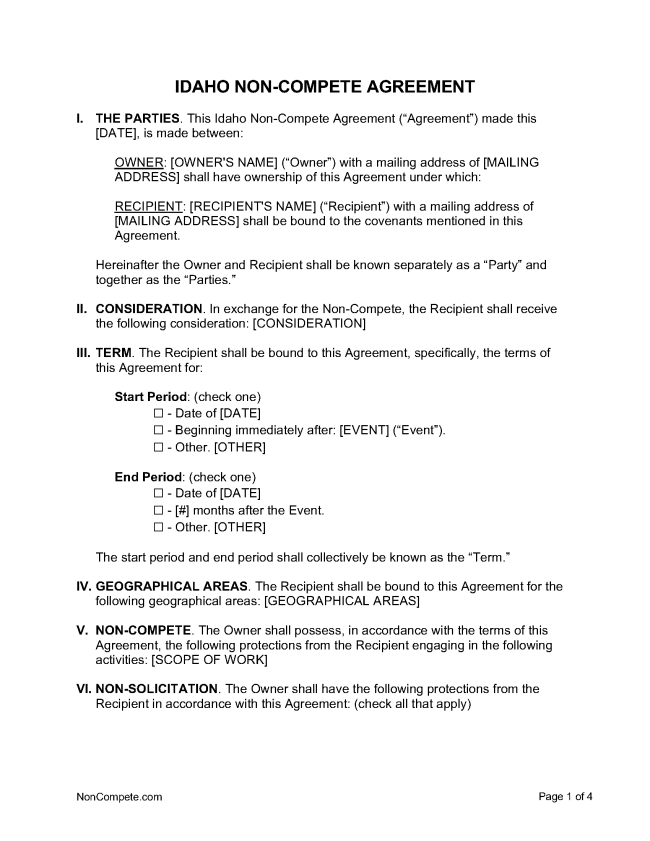An Idaho non-compete agreement is a contractual limitation on a person’s ability to work in a particular field or trade. Non-compete agreements in Idaho must be limited by geographic area and can only last for a set amount of time.
Idaho resembles other states because it follows a general “reasonableness” test in deciding whether a non-compete agreement should be enforced. Unlike some other states, non-competes in Idaho may involve independent contractors, but it’s not clear how courts will evaluate such agreements.
Table of Contents |
Are Non-Competes Enforceable in Idaho?
Yes. For a non-compete agreement to be enforceable, it must:
- Protect a legitimate business interest;
- Be reasonably limited as to duration, geographic area covered, and the kind of activity prohibited; and
- Does not impose a greater restraint than necessary to protect the employer’s legitimate business interest.
Covenants not to compete are valid when they are reasonable as applied to the party who is restrained from competing, the party who is seeking the restraint, and the general public. (Bybee v. Isaac (2008)).
Reasonableness
In order for a non-compete agreement to be reasonable and thus enforceable, it must:
- Be no more restrictive than necessary to protect a legitimate business interest,
- Not be unduly harsh and oppressive to the employee, and
- Not be harmful to the public.
Intermountain Eye & Laser Centers v. Miller (2005).
Sale of Business vs. Employment Contract
Courts are usually less strict in scrutinizing the reasonableness of a non-compete that is part of the sale of a business than they are when evaluating a non-compete that is part of an employment contract. Some protection of a business’s “good will” is usually implicit in the sale. (Stipp v. Wallace Plating, Inc. (1974)).
Protectable Interest
Legitimate business interests include but are not limited to an employer’s:
- Good will;
- Technology;
- Intellectual property;
- Business plans;
- Business processes and operation methods;
- Customer lists, contacts and referral sources;
- Vendor contacts and relationships;
- Financial and marketing information; and
- Trade secrets.
Trade secrets are confidential or sensitive information that non-compete agreements may protect and are defined by the Idaho Trade Secrets Act. Trade secrets are protectable interests, but a judicial order preventing their disclosure may be obtained even if they are not included in a non-compete agreement. Idaho Code Ann. § 48-802.
Merely preventing competition is not a protectable interest. Still, non-compete agreements may prevent competition involving former employees who were able to gain particular influence over clients and customers due to their time with the company. As a result, customer relationships are a valid, protectable interest.(Freiburger v. J-U-B Engineers (2005)).
Independent Contractors
Non-compete agreements involving independent contractors are potentially enforceable. (Pinnacle Performance, Inc. v. Hessing (2001)).
However, the “reasonableness” test applied to enforcing non-compete agreements involving employees does not necessarily apply to non-compete agreements involving independent contractors. It is not clear what standard is used. (Trumble v. Farm Bureau Mutual Insurance Co. (2019)).
Prohibited Professions
Employment or partnership agreements that limit a lawyer’s right to practice once the lawyer stops working for a firm or client are generally not enforceable, except for agreements concerning retirement benefits and some reasonable restrictions associated with the sale of a law practice. Rule 5.6, Idaho Rules of Professional Conduct.
Lawyers may not settle cases in a way that limits their right to practice in the future. Rule 5.6, Idaho Rules of Professional Conduct.
Physicians may enter non-compete agreements, but a court deciding whether to enforce the agreement will consider how the agreement impacts the ability of the general public and particular patients to access care. (Intermountain Eye & Laser Centers v. Miller (2005)).
Terminating an Employee
Title 44, Chapter 27 of the Idaho Code, which governs non-compete agreements, does not address whether non-competes are enforceable after an employee is terminated.
Burden of Proof
In order for a non-compete agreement to be enforced, the employer has the burden of proving that it has a legitimate interest in need of protection. (Freiburger v. J-U-B Engineers (2005)).
Continued Employment
Continued employment is adequate consideration to support a non-compete agreement. (Frantz v. Parke (1986)).
However, if the time period covered by the agreement is longer than 18 months, consideration beyond continued employment is necessary. Idaho Code Ann. § 44-2701.
Maximum Term
There is no clearly defined maximum term for non-compete agreements in Idaho. Courts have okayed non-compete agreements ancillary to selling a business involving limitations in a fifty-mile area for five years. (Bybee v. Isaac (2008)).
However, courts have said that a covenant not to compete in an employment agreement was invalid when it prevented the employee from competing in a two-county area for two years. (Intermountain Eye & Laser Centers v. Miller (2005)).
Blue Penciling (allowed)
Courts may judicially modify a defective non-compete agreement to make it enforceable. Still, if an agreement is lacking in terms fundamentally necessary to protect an employee, it cannot rewrite the agreement to make it enforceable. (Pinnacle Performance, Inc. v. Hessing (2001)).
